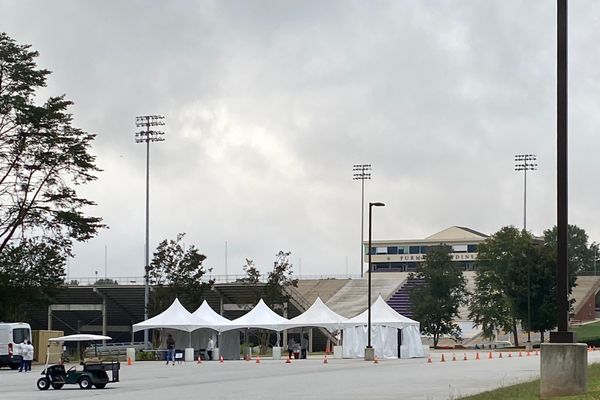In May, I wrote that it was time for a new Paladin Promise:
The administration should follow in the footsteps of Wofford and Wake Forest (and Harvard and Duke) by adding the COVID-19 vaccine to its list of vaccines required for all students. In return, they should promise that campus will fully reopen. No more mask mandate. No more social distancing. No more “hygiene theater.” No more limits on student gatherings.
Happily, Furman adopted this general course of action, and we’ve almost reached the long-awaited vision of normalcy. Although the Delta variant is keeping masks in classrooms – at least for the time being – so far campus feels more like 2019 than 2020. It’s been nice to wander maskless through the DH, encountering friends old and new while waiting to grab a cookie fresh off the platter.
According to the most recent data, approximately 92 percent of us are fully vaccinated or will be soon — definitely within the realm of herd immunity. I am confident that this year, we are unlikely to see the kinds of destructive outbreaks that leave whole peer groups in quarantine or isolation for 10+ days at a time.
But there’s still more we can and should do. Why are we only at 92 percent vaccinated? Why can’t we hit 100, or at least 98 or 99?
To my dismay and slight surprise, about 7 percent of the student body has requested an exemption to the vaccine requirement. At this point, it’s important to provide some context. Furman requires five vaccines: MMR (measles, mumps, rubella), Tdap (tetanus, diphtheria, pertussis), hepatitis B, chickenpox, and COVID-19. Students can request medical or religious exemptions to any of these vaccines—which is in line with the state law for K-12 education.
But for COVID-19 only, it’s possible to request a third type of exemption based on a “strong personal objection.” That caveat should be eliminated.
The proportion of exemption requests that fall under the strong personal objection category is not a matter of public record on Furman’s COVID-19 Dashboard, and the fact that requests have been made does not mean that those requests will necessarily be approved. But while valid medical and religious reasons to not get vaccinated exist, they are difficult to prove and only apply to a very limited subset of people. (Personally, I am doubtful that 7 percent of the student body either have a known anaphylactic allergy to the vaccine or are devout Christian Scientists.) This suggests that a large portion of the exemption requests that have been approved, or are at least being considered, fall under the category of strong personal objection.
As the semester progresses, I expect our vaccination numbers to continue to inch up — and the administration should be taking proactive steps to ensure that they do. To their credit, they have made things more costly for unvaccinated students, such as requiring them to quarantine off campus if infected. But now that full approval of the vaccine has finally happened, they should go all-in and cut the strong personal objection altogether. If someone without a valid medical or religious reason to forgo the MMR vaccine refused to get the shot, they would not be allowed to enroll as a student at Furman. The same should be true when it comes to COVID-19.
